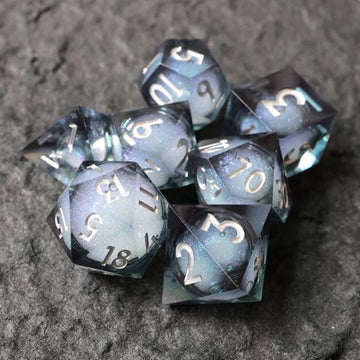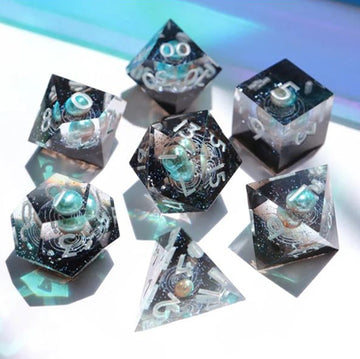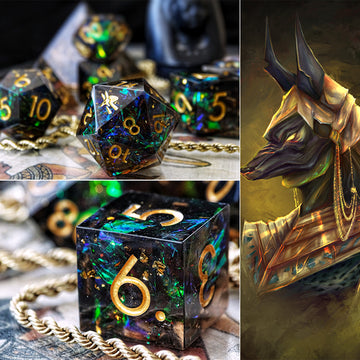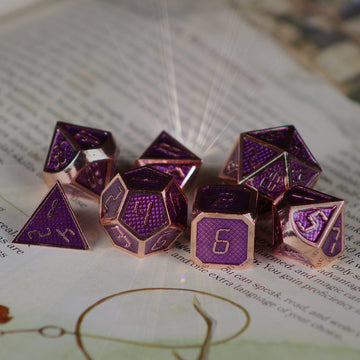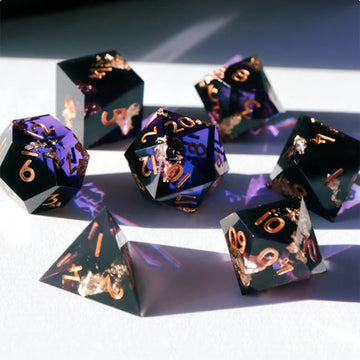There are many bard spells to choose from, but which ones are the best? This question has been pondered by many players, but the truth is that each spell has its own unique purpose. However, this doesn’t mean all spells are created equal!
Let’s go over some of what I consider to be the best bard spells in order to help you as you build your own spell list. Of course, these lists are not exhaustive! There are some other spells that I didn’t include for various reasons, but I hope you consider these spells for your next game.
Keep in mind the spells I will be mentioning are all found in the bard’s spell list from the Player’s Handbook, so I left out spells like wish and counterspell. However, remember that a bard can gain spells from other spell lists with the Magical Secrets feature at levels 10, 14, and 18. Now, let’s get started!
Support Spells
A bard might be the party’s only support; so, a bard should have a few support spells on hand in case something goes awry or to provide buffs. I’ve picked some of the spells I think will offer the most support both in and out of combat.
Healing Word
Let’s start with healing word, a 1st level spell that can heal your companions as long as they are within 60 feet of you. While this spell doesn’t heal too much, it only costs your bonus action, so you still have your action to attack or heal someone else.
Heroism
While heroism may not heal someone, it does prevent the target from being frightened. It also gives them temporary hit points equal to your spell casting modifier at the start of each of their turns. Remember that heroism is a concentration spell that lasts for one minute, but in a bind it might just save your melee fighter’s life.
Sleep
Similarly, sleep can end combat early, provided your party has worn down some enemy hit points. Although sleep may not put many enemies to sleep at its lower levels, it can provide your party with some breathing room, or a chance to escape.
Tasha’s Hideous Laughter
On the other hand, Tasha’s hideous laughter doesn’t put enemies to sleep or heal your companions. Instead, it causes a laughing fit that makes the enemy fall prone and become incapacitated.
Remember that attack rolls against an incapacitated creature have advantage. Also, if an attack hits and the attacker is within 5 feet, it becomes an automatic crit. This helps your melee fighter deal some serious damage.
Dimension Door
If you need to get out of a bad situation immediately, dimension door is the spell to use. While you are limited to only one additional creature, you can also bring objects. This means if you and the rogue find an item on a probably trapped pedestal, you can grab the item, the rogue, and then teleport 500 feet away in an instant.
Alternatively, you can use dimension door to get a companion out of danger while buying time to heal them. Although this spell isn’t as strong as teleport, dimension door is a 4th level spell and it only has a chance to fail if you try to move to an area already occupied by a creature or object. Therefore, I’d argue dimension door is better in a tight situation than teleport.
Mage Hand
Mage hand is a useful cantrip that can let you safely trigger potential traps or touch objects. For example, if that chest in the center of the room really is trapped or a mimic, then it would be better to send the magical hand to open it instead of a companion. Unless, of course, you want to tell the party’s rogue “I told you so”.
Detect Magic
Another useful spell is detect magic. It allows you to sense the presence of magic by seeing an aura around the magical object or creature, and allows you to learn the school of magic (assuming it has one).
In fact, a detect magic spell could tell you if that odd chest you found has some evocation magic. If this is the case, get behind a wall and send out your mage hand, just to be safe.
Invisibility and Greater Invisibility
Even if there is a rogue in the party, there is no harm in having invisibility and/or greater invisibility at the ready. The primary difference between these spells is that invisibility ends if the creature the spell is used on makes an attack or casts a spell. Greater invisibility doesn’t have this rule.
If the party needs to sneak into a royal ball or the rogue needs to rob a bank, either of these spells could mean the difference between success or a jail cell.
Foresight
When talking of supportive spells, I cannot leave out foresight. This is, arguably, one of the best buffs. For the next 8 hours, whoever has this spell cannot be surprised, they have advantage on all dice checks, and anyone that tries to attack them will have disadvantage.
Of course, foresight will end if you try to cast it again before 8 hours are up, so it might be wise to give this to the face of the party (which, as a bard, is probably you) or your primary melee fighter if you plan on going into a dangerous area.
Glibness
Finally, we come to glibness. This spell could mean the difference between success and failure when it comes to Charisma checks and telling the truth.
Until the spell ends, you can choose to replace any Charisma check roll with a 15. Also, magic that would determine if you were lying instead says you are telling the truth. Therefore, it’s use in high risk Charisma-dependent situations could be invaluable.
Generally speaking, these spells are valuable in or out of battle. However, a bard is more than a support class. They also have combat spells.
***
Combat Spells
While bards don’t have the same versatility as melee classes, their known spells can really pack a punch and add a new dimension to combat encounters. As with support spells, this list contains some of the best combat-based spells to help your bard dominate the battlefield.
Vicious Mockery
Vicious mockery is one of the most well-known bard spells and is almost a must have. While this cantrip doesn’t deal much damage, it can impose disadvantage on the target’s next attack roll.
Basically, if you are almost out of spell slots and you can’t offer much more support to the party, you can insult a monster so much it might miss every single attack it makes while also taking some psychic damage.
Bestow Curse
Generally speaking, bestow curse has a lot of different uses depending on the situation. If you can get close enough to an enemy to touch them, then you can either:
- force disadvantage on attack rolls against you,
- if they fail a Wisdom save they can’t do anything during their turn, or
- make it so your attacks and spells deal an extra 1d8 necrotic damage.
Note that the target must fail a Wisdom saving throw for this spell to take effect, so it’s best used against larger, beefier enemies that have a higher chance of a low Wisdom modifier.
Hold Person and Hold Monster
Both hold person and hold monster have the same benefit, depending on the situation in battle. The targets will need to make Wisdom saving throws, but if they fail they become trapped. While they can repeat the saving throw on their turn, this gives your party vital time to deal damage or regroup and take some potions while you focus on maintaining the spell’s concentration.
Eyebite
Eyebite is a useful spell in combat because it can cause a target that fails their Wisdom save to fall asleep or become panicked or sickened. Each of these effects is beneficial to combat and the best part is that you get to choose the effect.
While the spell requires concentration, it could be used to give the party some breathing room against enemies and could turn a difficult encounter into an easier one.
Forcecage
Imagine a magical prison for your enemies or an impervious box to protect you and your allies for one hour. The choice is yours. But even more impressive, forcecage is one of the few spells that cannot be dispelled by dispel magic.
In fact, if you create a solid box, no spells or matter can be passed in or out of it. Also, no one can leave it by non-magical means. So if anyone is trying to teleport out of the box, they have to pass a Charisma saving throw or remain trapped.
Polymorph and True Polymorph
The primary difference between polymorph and true polymorph isn’t just the power of transformation (say, turning a lich into a coffee table), but also that the effect of the spell remains until dismissed.
In fact, using polymorph in battle could mean the difference between life and death. For example, you could turn a powerful enemy into a duck and then kill the duck. Therefore, a hard encounter just became easy.
True polymorph, however, has an added benefit一if you maintain your concentration for the spell’s entire duration then the transformation lasts until the spell is dismissed. Generally speaking, this means you can permanently turn a lich into a coffee table or a duck, whichever floats your boat.
Dominate Person and Dominate Monster
Dominate person and dominate monster have numerous benefits in combat situations. For example, if the target fails their wisdom saving throw, you can control them telepathically. Interestingly, the target will only make another saving throw if they take any damage. Therefore, if you take control of a powerful monster or person that has healing or blocking spells, you could order them to use those spells or to remove your comrades from dangerous situations.
These spells are great for combat, but they could also have other uses. After all, what’s more terrifying than a high level bard casting dominate person to prove a point during a meeting between two opposing forces? Use that creativity to push your spells to the limit and really mold situations in your favor!
Now, let’s go over a few more spells that didn’t quite make it to either of these lists, but which I feel are worth mentioning.
***
Honorable Mentions
There are so many fantastic bard spells that fitting them all into this article was nearly impossible, but there are some spells which I believe deserve to be mentioned for simply being spectacular.
Suggestion and Mass Suggestion
Let’s start with suggestion and mass suggestion. Both of these spells can be helpful for crowd control or for getting a pesky guard to leave you alone. Bards can also use these spells for trying to get certain things done and making life generally easier for the party.
Resurrection
Resurrection, however, is also a spell I can’t go without mentioning. If there is no cleric in the party, then this spell could bring back a fallen ally without having to go to a temple. Although the spell is very expensive (costing a diamond worth at least 1,000g) that cost might be worth it to bring back a fallen party member.
Power Word Kill
Power word kill gets an honorable mention simply because there is no saving throw, but it does have one important caveat. If the target has more than 100 hit points then the spell fails. Otherwise the target will instantly die and you’ll literally get the last word.
***
Overall, while every bard spell is unique and has its own purpose, some spells are better than others. But don’t let these lists limit your creativity! The spells here are just suggestions. After all, depending on how you play your bard, some of them may not work for you!
The best way to decide on your own unique best spell list is to experiment by trying ones you’ve never used before. With a bit of creativity, any spell can become a major force in your game!
If you feel ready to cast some spells from these lists, or try some other spells not listed here, then why not roll for those spells with a brand new bard inspired dice set? Now get out there and get casting!


